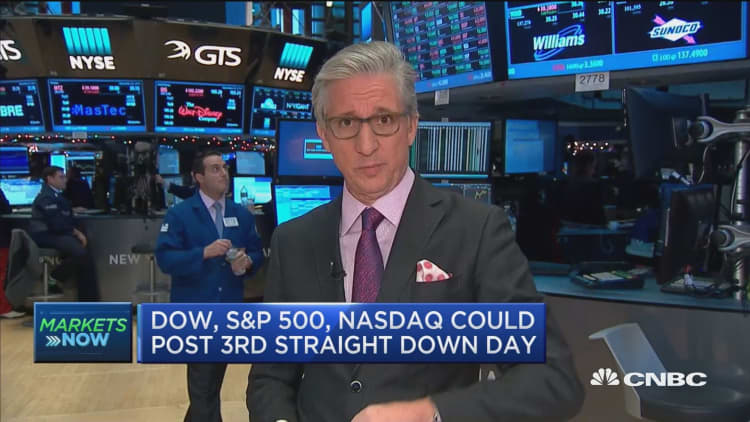
U.S. equities closed mostly flat on Friday ahead of the Christmas holiday, as the Dow Jones industrial average failed again to reach the psychologically important level of 20,000.
The Dow closed about 15 points higher, with UnitedHealth contributing the most gains. "This is the last full trading week of the year. The Dow has been flirting with 20,000 and what I think is happening is a pause to digest a massive move higher," said Adam Sarhan, CEO at 50 Park Investments. "The market doesn't go straight up. I think this market action is healthy."
Entering Friday's session, the blue-chips index was about 0.4 percent away from hitting 20,000, having come within 13 points of the level earlier this week.
"Santa needs to visit Wall Street in order for the Dow to get above 20,000. We know Santa is making his rounds, so if he doesn't visit today there's a very high likelihood he visits next week," Sarhan said.
The S&P 500 also closed 0.1 percent higher, with health care leading advancers and consumer discretionary the greatest laggard. Health care is the worst performing S&P sector for the year, having fallen more than 3 percent. "We have avoided the health care sector. Our work shows it earnings growth is trending down," said Chuck Self, CIO at iSectors.
The three major indexes posted slight weekly gains.
Trading volume in the U.S. evaporated this week, as most investors and traders have left their offices in light of the Christmas holiday. U.S. markets will be closed Monday in observance of the holiday.
"Many of those who work at buy side institutions have already left for the tropics or the mountains. Although the extremely thin liquidity ahead of the long weekend make stocks susceptible to a bit of bullying, shares should drift quietly during the next several hours," said Jeremy Klein, chief market strategist at FBN Securities.
In economic news, consumer sentiment for December came in at 98.2, above the expected read of 98.0. New home sales rose 5.2 percent last month, more than expected.
Overseas, investors kept an eye on European banks, after Italy approved a state bailout for Banca Monte dei Paschi di Siena, the world's oldest bank and the country's third-largest lender.
Meanwhile, Credit Suisse agreed in principle to pay U.S. authorities $2.48 billion to settle claims it misled investors in residential mortgage-backed securities it sold in the run-up to the 2008 financial crisis. Germany's Deutsche Bank also agreed to settle a separate lawsuit with the U.S. government.
"There is finally some good news for European banking sector," Naeem Aslam, chief market analyst at Think Markets, said in a note. "However, the holes in this sector are still far from being filled, as [Monte dei Paschi] has also asked for a rescue fund which the Italian government may have to provide as well."
The U.S. dollar fell marginally against a basket of currencies, with the euro near $1.045 and the yen around 117.3. U.S. Treasurys traded mixed, with the two-year note yield rising to 1.20 percent and the benchmark 10-year note yield slipping to 2.54 percent.
Major U.S. Indexes
The Dow Jones industrial average rose 14.93 points, or 0.07 percent to 19,933.81, with UnitedHealth Group leading advancers and Microsoft the biggest decliner.
The closed 2.83 points higher, or 0.13 percent, at 2,263.79, with health care leading eight sectors higher and consumer discretionary the top decliner.
The Nasdaq composite rose 15.27 points, or 0.28 percent, to end at 5,462.69.
About nine stocks advanced for every five decliners at the New York Stock Exchange, with an exchange volume of 502.26 million and a composite volume of 1.983 billion at the close.
The CBOE Volatility Index (VIX), widely considered the best gauge of fear in the market, traded near 11.6.
High-frequency trading accounted for 52 percent of December's daily trading volume of about 7.56 billion shares, according to TABB Group. During the peak levels of high-frequency trading in 2009, about 61 percent of 9.8 billion of average daily shares traded were executed by high-frequency traders.
—Reuters contributed to this report.


